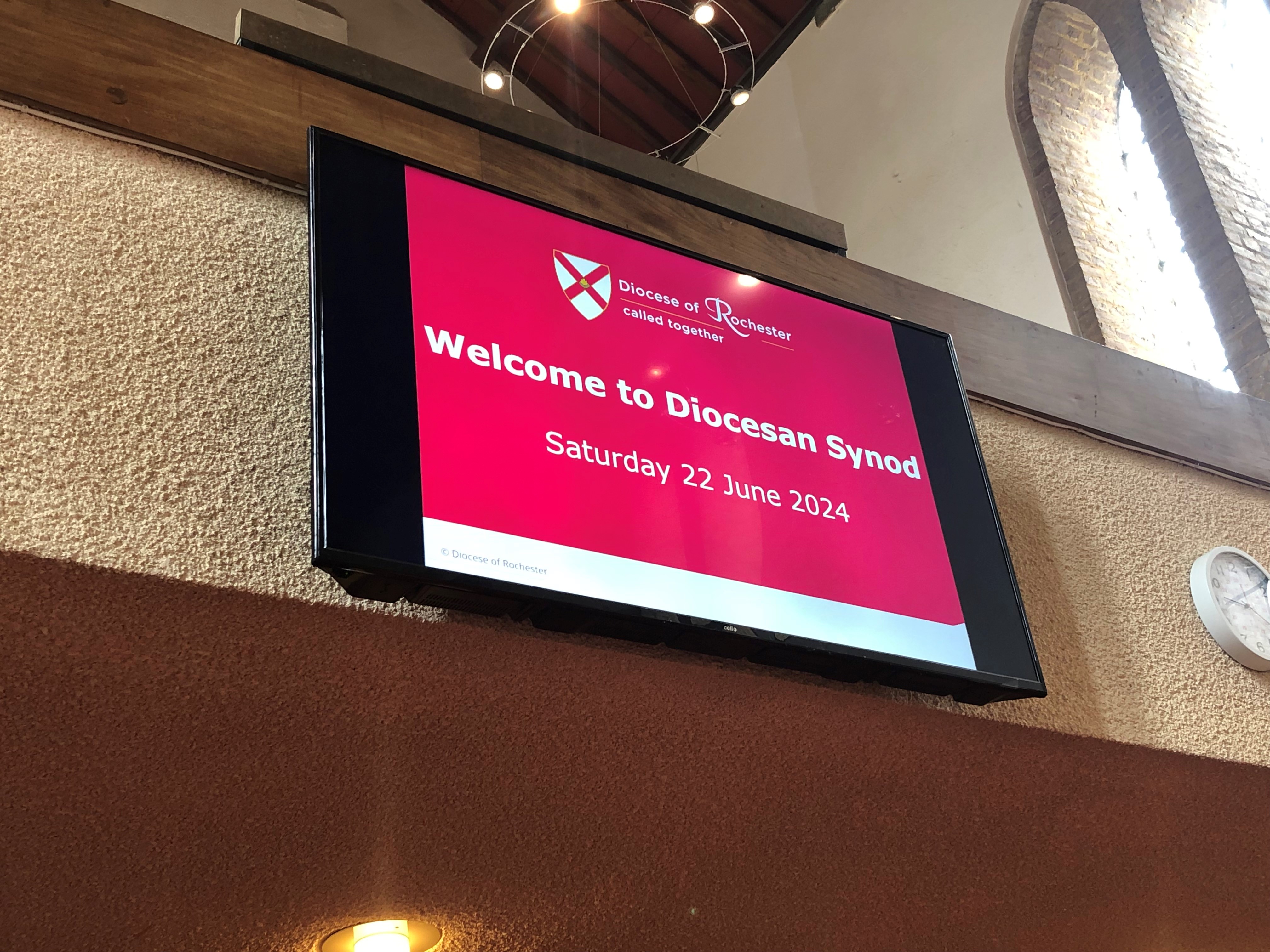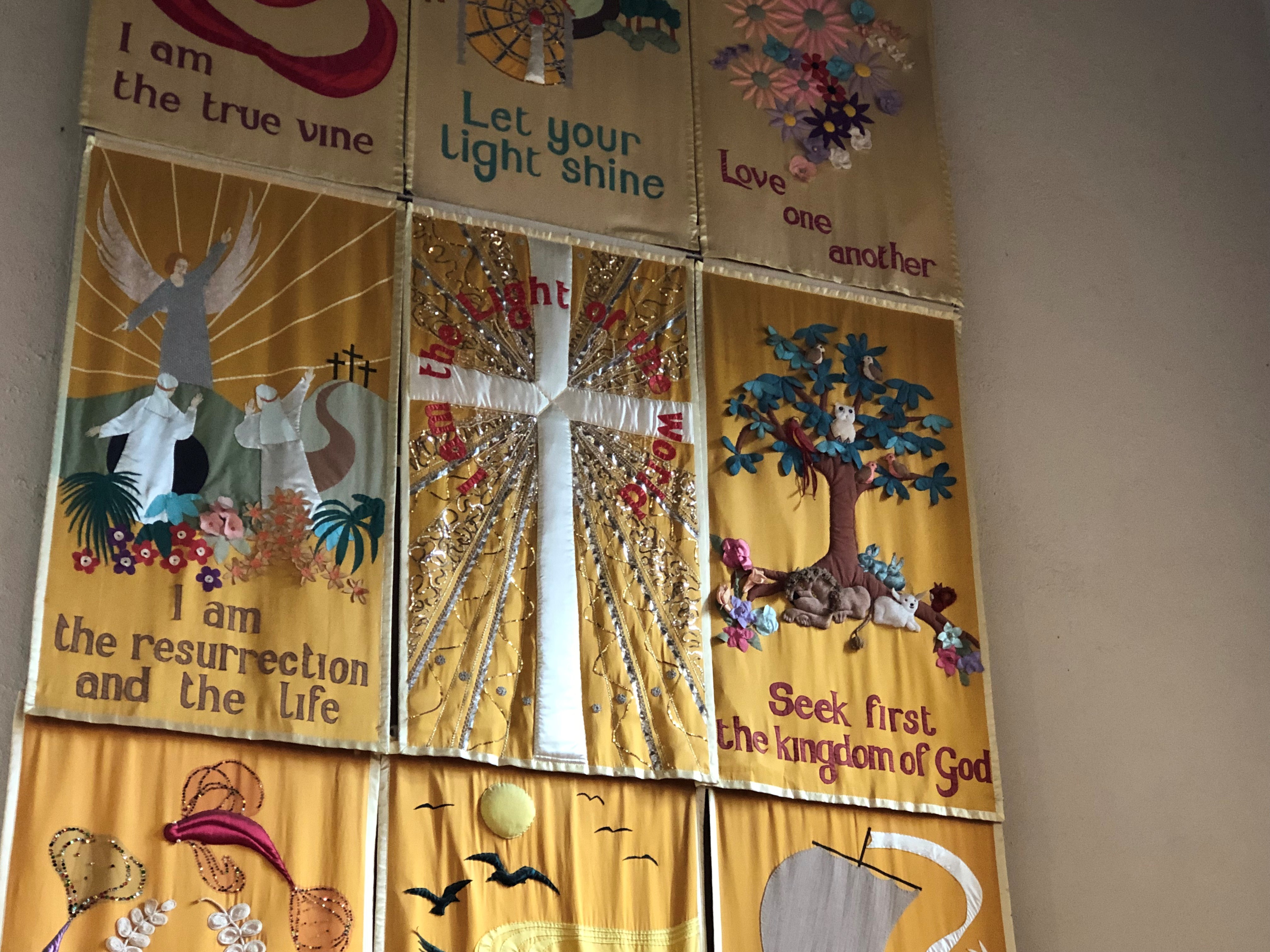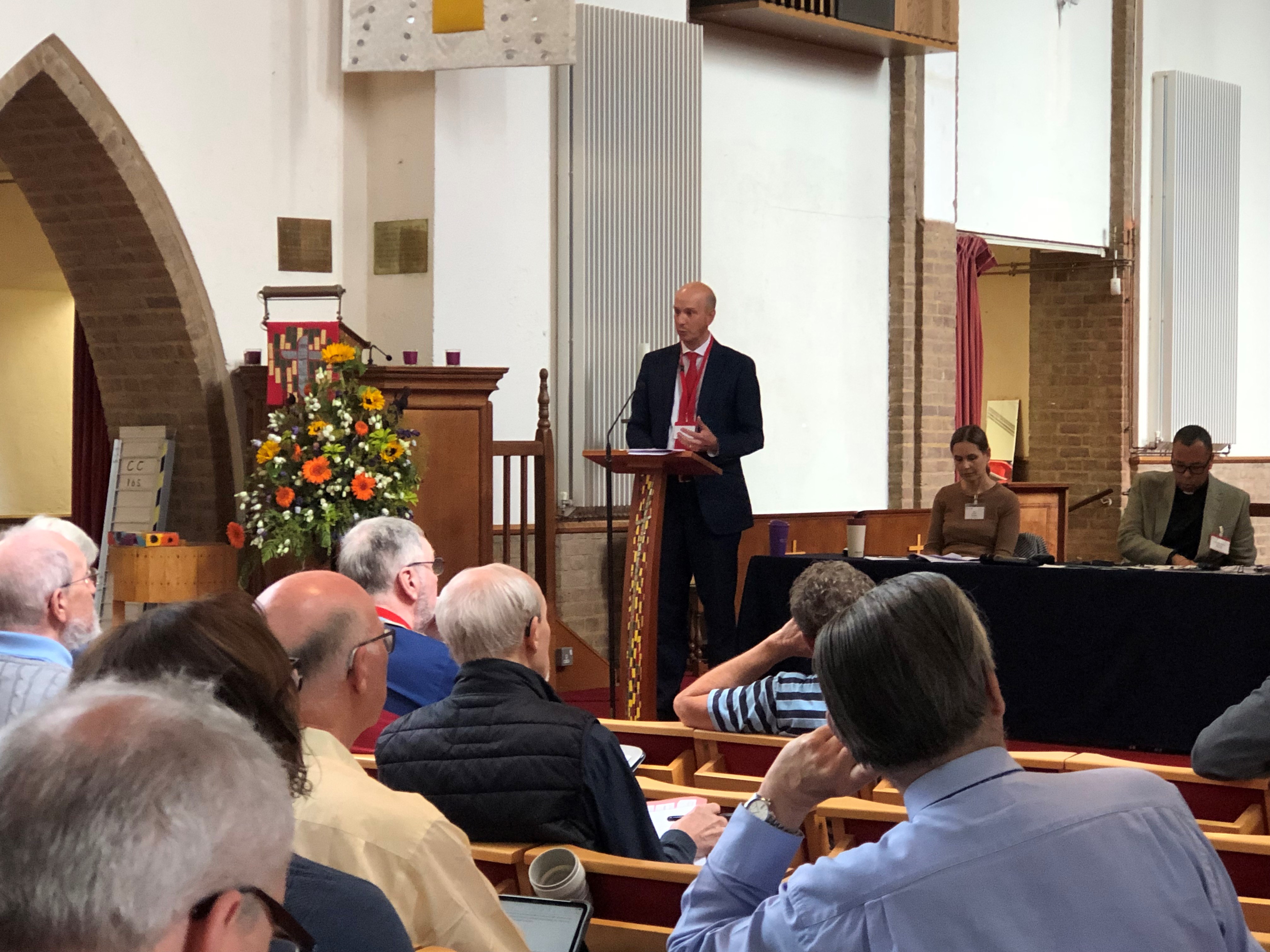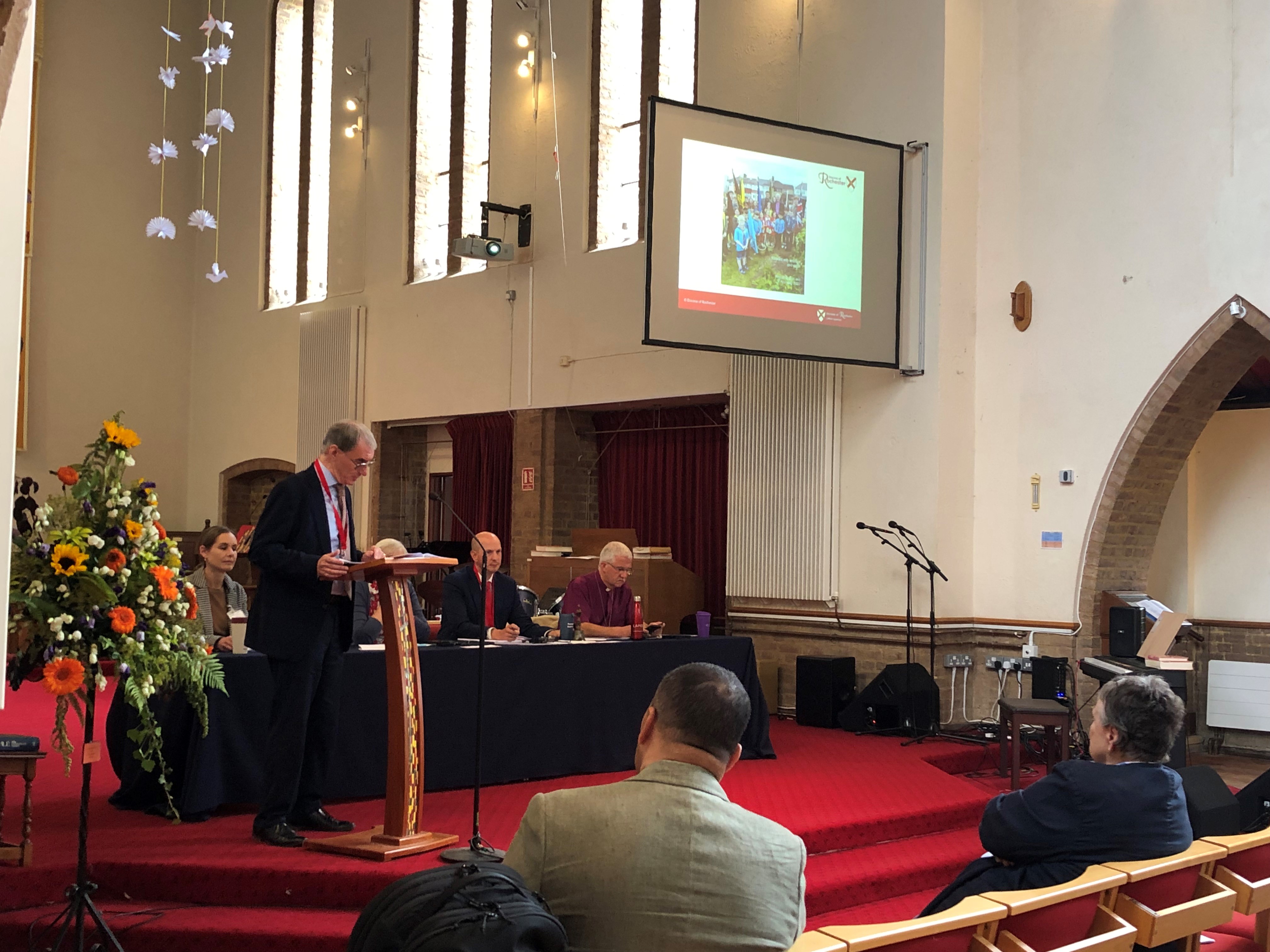
Christ Church, Orpington was the setting for the most recent gathering of Diocesan Synod, which took place on Saturday 22 June.
The main focus of the agenda was an update on the continuing work around the vision and strategy, as well as a presentation of the Diocesan Annual Report and Accounts for 2023.
Meeting on Windrush Day, the opening worship was led by the Rev Canon Jeremy Blunden, Bishop’s Adviser for UK Minority Ethnic / Global Majority Heritage matters.
The worship offered Synod members an opportunity to remember the contribution of the Windrush generation to the life of our nation.
It was also a chance to reflect and lament upon the racial injustice the Windrush Generation faced then, and that they continue to experience today in society and tragically, within the Church itself.
A common call in Jesus - Bishop Jonathan’s presidential address
While acknowledging the scale of division and conflict in the world, as well as sadly in the Church, Bishop Jonathan said that he wanted to remind everyone of our fundamental common calling as followers of Jesus Christ, which is to:
‘...love and serve God and to love and care for our fellow human beings and the rich and wonderful world that God has given to us to inhabit and to pass on to those who will share it next.
He continued:
“In these interesting times, our task, our calling, is to focus on the things that really matter to God and that he calls us to care about.”
In the context of that day’s Synod and agenda, he said that meant a consideration of the Annual Report and Accounts of the Rochester Diocesan Board of Finance.
He said the story being told within the Report was, 'a celebration of the way we as a diocesan family are, ’together, using our God-given resources to serve the cause of God’s kingdom in this place.'

Reflecting on some of the practical and financial challenges facing the Diocese, Bishop Jonathan reassured Synod that his, commitment, along with those with leadership in the Diocese, was to supporting parishes:
“I am, and will remain, utterly convinced that the beating heart of the Church of England is in its parishes – in the ministry of clergy and lay people in each and every community up and down this land.
"And it is that ministry that I believe God wants to grow in this Diocese and across the Church of England.”
He continued:
“And that conviction is at the heart of our diocesan vision and strategy – Change, Serve, Grow…[which] is all about enabling our local churches to take their full and rightful place at the heart of our communities: serving God and serving the people, loving God and showing his love in and to our communities.”
Ongoing work around the vision and strategy
The first item of business was a presentation by Matthew Girt, Diocesan Secretary, on the latest work around the developing vision and strategy.
Matthew began by feeding back some of the responses that had been gathered through the holy listening process Synod members took
part in at their last meeting.

During that process, they had been asked to reflect upon three questions:
- What is God saying about mission and ministry in this area?
- If you had £100,000, what would you do with it?
- In order for us to grow, how can we better serve? And what change might happen as a result?
Matthew said the responses showed a wide range of ideas, as well as a passion and commitment to growing God’s Kingdom.
There was also a recognition of a need for change to allow us to serve local communities and a real sense of hope for the future.
Additionally, the responses showed an understanding that churches and church leaders need more resources and support, specifically to help them with:
- Developing confident missional leadership
- Working with children, young people, and families
- Increasing diversity
- Governance, stewardship, volunteers, finances, property maintenance, safeguarding
- Reaching local communities
Matthew explained that based on what had been heard through this listening process, and in other forums, work had been able to begin on setting future missional priorities.
The vision is increasingly being broken down into key themes, with the four areas particularly emerging, although not exclusively, being:
- Children and young people – who are vital for the future and the present. While there is much good work going on, there is a shortage of trained leaders which needs to be addressed.
- Mixed ecology – supporting growth through pioneering, planting and resourcing churches
- Missionally healthy places – helping churches to grow spiritually, and numerically, to impact their community, and be financially healthy
- Leadership development – this is a cross-cutting theme, as it cannot be expected for any of the other things to happen if we don’t have confident missional leaders rooted in the love of God.
Therefore, what is being developed, is a multi-level approach with elements designed to address the challenges and opportunities facing the Diocese as a whole.
Matthew said that at its heart, this is a plan focussed on investing in parishes.
He explained that the work to bring this all together has already begun is being overseen by a Programme Board, chaired by Bishop Jonathan, which reports to Bishop's Council.
The final vision and strategy will be presented to the next Diocesan Synod in December, with expectations to hold Archdeaconry events in early 2025 to engage and roll out the vision across the Diocese, meeting as many people as possible.
In the meantime, resources to fund the plans are being sought, with diocesan colleagues working hard on a substantive bid to the Church Commissioners in the next few months.
Sharing ‘good news’ from the Archdeaconry of Rochester
Attending his last Diocesan Synod before he steps down as Archdeacon of Rochester in September, the Ven Andy Wooding Jones, had the opportunity to share some of the good news coming out of Rochester Archdeaconry.
Sharing broad examples across the area, Archdeacon Andy explained that he is seeing the different Pauline and Petrine forms of ministry being expressed.
Peter was very much focused on ministering to the community he knew, while Paul had a ministry to the Gentiles. Both are valuable, and Andy is seeing elements of each in the work churches are undertaking in Rochester Archdeaconry.
In terms of Petrine ministry, there is some intentional work around engagement with church schools.
Thought is also being given to intercultural worship, with some churches asking themselves questions such as, ‘Who are we seeing attending church on a Sunday?’, and ‘How do we make everyone feel welcome and comfortable?’
In terms of Pauline ministry, a lot of churches are looking at their community outreach and engagement.
To highlight some of the Strategic Development Funded projects in Chatham, Strood and Gillingham, particularly, they are feeding back surprise at who is connecting with them through the initiatives they are runing, and the growth and impact that is ensuing.
Annual Report and Accounts approved
John Jackson, Finance Director, and Nigel Pope, outgoing Chair of the Diocesan Board of Finance, presented Synod with the Annual Report and Accounts for 2023.
This year’s theme is, Forward with hope and vision, and John and Nigel invited Synod members to encourage those within their congregations to take a look at the report online, and to use the accompanying materials that will be made available to parishes to help them share the highlights, as there was much of interest within it.

Moving on to reviewing the financial picture, John noted that there had been an improvement in the Common Fund operating deficit (per the management accounts) of £0.1m compared to 2022, with a reduction from £1.4m to £1.3m.
This was also £0.2m better than the 2023 budgeted deficit of £1.5m.
The overall result per the statutory accounts was a surplus of £3.3m, compared to a deficit of £4.6m in 2022, with increases in the value of the investment portfolio being a major contributing factor.
However, John also highlighted a shared challenge for the Diocesan Board of Finance and the parishes, which is that there has been a fall in Parish Offer contributions since 2017 of 20 percent – and there is not expected to be any significant growth of contributions in 2024.
With parish contributions making up 77 percent of income into the Common Fund – a substantial part - this gradual decline does present a challenge.
Despite this, there is still a real commitment from the Diocesan leadership and Board of Finance to continue to invest in parishes and parish ministry.
Evidence of this includes an increase in stipends in April of 5 percent, as well as the plans being outlined in the emerging vision and strategy.
Nigel Pope went on to give an overview of the performance of the diocesan investment portfolio, which has been impressive, with 2023 seeing a total return for the portfolio of 19.7 percent.
The single largest contribution to this was £3m gained on the sale of the Upper Beckenham asset. Overall, however, even excluding the Beckenham sale, diocesan investments had a strong performance in 2023.
Giving an overview of the financial strategy, John stated that it is an express strategic aim of the Diocesan Board of Finance to achieve a financially sustainable position and to successfully underpin all the work of mission in the Diocese.
Key to this is sustaining the parish structure and investing in renewal and recovery, as well as investing in future ministry and the emerging church.
Tools to realise this strategy include:
- Utilising Total Return
- A substantial bid to the Church Commissioners
- Encouraging a turnaround in the decline of Parish Offers.
John explained that the current consultation on the Parish Offer system was giving some very useful insights into areas where the system itself may or may not be working to encourage and increase the level of Parish Offers.
Both Nigel and John were clear that Rochester Diocese is not the only diocese facing the challenge around Parish Offers, or to be reporting a deficit.
However, where the Rochester Diocese Board of Finance does strike a different tone from some, is the commitment to supporting parishes and investing and growing our way out of the deficit.
Synod approved the Annual Report and Accounts for 2023.
A new Chair of the Diocesan Board of Finance
The presentation closed with a tribute to Nigel who stepped down as Chair of the DBF after five years dedicated service in the role.
Nigel told Synod that he had felt called to the role and had felt fortunate to have been able to use some of his experience and skills to help the diocesan family in this way.
He acknowledged that it had been a challenging but good time and that it had been a privilege to work with such good people.
He reassured Synod that 'there are many good and skilled people within the Diocesan Team who are all working, like the parishes, to grow the Kingdom of God.'
It then fell to Synod to approve Stephen Smith as the next Chair of the DBF.
Safeguarding update
Synod closed with a Safeguarding update from the Ven Andy Wooding Jones, in his role as Bishop’s Lead for Safeguarding.
Andy drew Synod’s attention to the forthcoming debates scheduled for General Synod on the work being done to explore the recommendations laid out in reports such as the Jay Report, into the future of safeguarding within the Church of England, particularly around independence.
He also updated that the Diocesan Safeguarding Team would be adopting a new national case management system in July.
Archdeacon Andy took the opportunity to announce that The Ven Allie Kerr, Archdeacon of Bromley and Bexley, will be taking on the role of Bishop’s Lead for Safeguarding, once he has stepped down in September.
Diocesan Synod next meets in December.